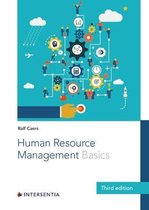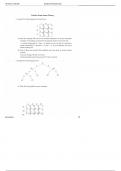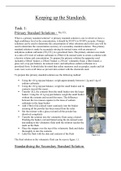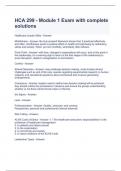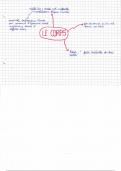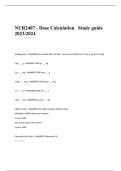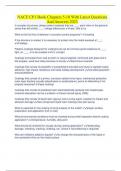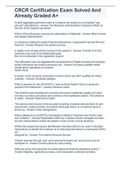1 Chapter 1: HRM definition and history & the importance of
evidence
1.1 HRM: definition and history, what is HRM?
What is management? (to define HRM we start with the definition of management)
o Management is the attainment of organizational goals in an effective and
efficient manner through planning, organizing, leading and monitoring
organizational resources
1.1.1 HRM definition
1.1.1.1 Organizational resources
Management is the attainment of organizational goals in an effective and efficient manner
through planning, organizing, leading and monitoring organizational resources
Organisational resources can be everything: money, innovation, people,…
‘Managing’ humans
Human machines
o Don’t let them go in overdrive
Comparing it with a capital machine
Is a human expensive when we compare it with a machine?
Investment of hiring 1 person in a firm: whats the value/cost of
hiring a person for the company?
1 fte = 1 000 000 euros hiring a person is a LT commitment
o Salary of 50 000 euros 50 000* 20 years = 1 000 000
If you hire someone you need to have the intention that you
are investing in them for 1 000 000 euros
Easier to see the value of machines
How do you treat that human?
Do you let them go in overdrive? Burnout
In a service firm
70% to 75% of the cost is people cost so it’s a huge cost, thats why
HRM is so important
o Maintain (train) when necessary
What type of personnel do we need? (planning)
How will the work floor be organised? (organising)
Motivate workers (leading)
Monitor performance (monitoring)
1
,‘Managing humans’ is a team effort
it’s not just HR, different aspects
o Direct impact on the employees = rode lijn (HR can deliver its message in a
controlled way
Teambuilding events
Company culture & EB
Surveys
Social law
o Indirect impact from HR on the employees
o Managers can also have an invluence on how the employees feel in the
organization, how they perform and how long they stay with the organization
o Managers are closer to the employees than HR, because of their daily contact
o A lot of operational HR is done by the managers
o HR will give you a frame but the manager will decide eventually
o Direct impact on the manager
Training to prevent errors
Saving the day if errors occur
Guide employee in recovery process (ex.: employee works 12
hours and 6 days managers ask what he is the added value
for the organization HR can’t prevent the damage, they can
only guide employee in recovery process
Support in HR matters
2
,
o Each employee can be the coach of another (motivate eachother)
1.1.1.2 Effective and efficient manner
Management is the attainment of organizational goals in an effective and efficient manner
through planning, organizing, leading and monitoring organizational resources
Good HR
Effective
o Do what you promise to do
Efficient
o Within budget
Calculated
o Make your business case like other departments do
1.1.1.3 Attainment (=bereiken) of organizational goals
Management is the attainment of organizational goals in an effective and efficient manner
through planning, organizing, leading and monitoring organizational resources
‘Managing’ humans can be hard
Shareholders have invested and want profit, more than the banks’ interest rate
o HR is there to help the shareholders to make more profit: achieve
organizational goals
HR is not there for the people, employees, the well-being of the staff
Back in the days, I used to say
o If you want to do HR because you like people, go and do something else.
Become a doctor or a social worker, but don’t do HR.
Never forget this quote: The decision is ruthless. Ethics are in the execution.
o You have to stay profitable
ethics: how are you going to do that?
Temporary unemployment (no profit loss because you don’t fire them)
Organization (1000 employees) decides to restructure 100
employees unemployed, makes them unhappy will secure
the remaining 900 jobs 900 remaining sad (friends leave)
tough decision: HR needs to implement it in the best possible
way (assist the leavers and help the stayers: so work on well-
being of the staff)
o Decided to do the dismissal
Last arrow: how they did it it has to be executed
3
, Today, I say it differently: If you want to do HR because you like people, optimise
your soft skills and train your strategic (hard) skills
o Primary responsibility HR = organization (goals), BUT well-being = still
important
o Motivated employees work better and contribute more to achieving goals
o So that you can influence the discussion on the strategy
No discussion no solution
o 2008 crisis high WLH
o Now: labor market is thight
So it’s important that you keep your employees because you will not
find new employees
If they don’t have right skills you (re)train them bc there are no other
employees to vervang them with (re)training to have right skills
o Proximus heeft 2000 werknemers ontslagen om er dan 2000 nieuwe aan te
nemen omdat ze niet de juiste skills hadden dit is nu niet meer mogelijk
Nu moet je ze trainen en coachen zodat hun skills beter worden want
er zijn geen andere werknemers
HR is not a charity
Motivated, educated and properly led workers deliver better performances and
contribute more to the attainment of the organizational goals
Focus on ‘managing’
HR may be more a means than an end, HR’s first responsibility is with the
organization
1.1.2 The 4 roles of HR
Dave Ulrich: Made a model
o
o HR sets out the broad outlines that are later translated into concrete changes
for employees
o A model that explains what HR is doing You can put it in 4 roles
o Exam: you get a case and need to decide which role it is
o You can also combine these different roles but in this model you split it all up
4


